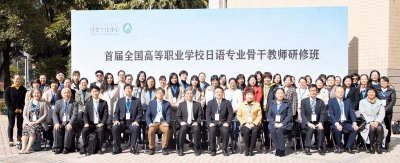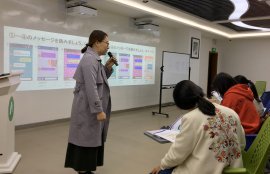Tackling Mainland China with Three Japanese-Language Specialists!
THE Japan Foundation, Beijing
WANG Chongliang, FUJII Mai, OOWAKI Gen
In October 2019, trial Japanese-language courses for mainstream learners were held at The Japan Foundation, Beijing (hereinafter the “Foundation, Beijing”) using “Marugoto: Japanese Language and Culture.” The title of the slides used in those lessons was: “With this, even binge shopping will be okay.” Prior to the global spread of the new type of pneumonia, there had been conspicuous press coverage in Japan surrounding Chinese tourists visiting the country. However, China boasts the largest number of Japanese-language learners and Japanese-language teachers of any country in the world (there are around one million Japanese-language learners and around 20,000 Japanese-language teachers affiliated to educational institutions, accounting for one quarter of the world’s Japanese-language learners and Japanese-language teachers respectively!), and the range of individuals with an interest in Japan and Japanese culture is very broad. To cite an example of Japanese-language education, the largest number choose the Japanese language out of the examinees in the “gaokao” (China’s National College Entrance Examination) who choose to sit a language other than English for their foreign language subject exam. Many teacher training programs are also held by academies connected to the Japanese language (including Japanese culture and Japanese literature), as well as by publishing companies that handle Japanese-language teaching materials. Frequent exchanges are also held with Japanese universities, and there are a large number of teachers who have obtained degrees in Japan. Consequently, even compared with other countries, a well-developed environment for Japanese-language education exists in China.
Within this environment, Japanese-Language Specialists dispatched to The Foundation, Beijing have been continuously holding training programs on teaching methods for “cultivating cross-cultural awareness abilities,” “learners discovery-based learning” and “task-oriented-based learning” at teacher training workshops for senior secondary schools and universities. Teachers are endeavoring to incorporate new teaching methods and the ideals advocated in the educational standards, which the Chinese government has been actively announcing and revising of late, into their teaching practice, even as they struggle with the differences in learning environments and the circumstances between the current learners and them.
Information on these activities is also posted on the Foundation, Beijing’s website. In addition, we are constantly striving to develop projects that capture new needs in China, which in recent years has experienced rapid changes both economically and socially. Below, we would like to introduce three projects that we newly began in 2019.
The First Japanese-Language Teacher Training Program in Three-Year Vocational Universities
Currently there are approximately 180 three-year vocational universities (vocationally-oriented three-year junior colleges) in China where a Japanese-language major is offered as a course of study. However, up until now there had been no training programs for the Japanese-language teachers at these vocational universities. Consequently, based on consultations between The Foundation, Beijing and the “Japan-Korea subcommittee of the committee for full-time foreign language educators at three-year vocational universities,” which is attached to China’s Ministry of Education (equivalent to Japan’s Ministry of Education, Culture, Sports, Science and Technology), it was decided to jointly hold the first national training program for Japanese-language teachers at three-year vocational universities, in Guangzhou. The two-day (December 7 and 8, 2019) training program attracted the participation of 45 Japanese-language teachers from three-year vocational universities throughout China. The program included keynote speeches from Tokyo Institute of Technology Associate Professor Yahiro Hirakawa and Tianjin Foreign Studies University professors Xiu Gang and Li Yunbo on learner-focused teaching methods that emphasize communication. An introduction on how to use the so-called “Teaching Material for Japanese for Life in Japanese” (the tentative name of the time for “Irodori: Japanese for Life in Japan”) and mock lessons by participants were also held. The participants rated the program very highly in a survey carried out after it ended, and so it was decided to continue holding it in the future also.

Training in China is always accompanied by a commemorative photograph
Teaching Contest for Japanese-Language Education Classes at Secondary Educational Institutions
A large number of teachers participate in the training programs that we carry out. To ensure that the teachers do not simply end up feeling good about having joined the programs, and instead put the things they have learnt there into use in their actual lessons, we held the “Teaching Contest for Japanese-Language Education Classes at Secondary Educational Institutions” for Japanese-language teachers at secondary educational institutions.
We had the applicants choose a chapter from a textbook they personally had used up to now, and draw up a teaching plan that incorporated the content they had learnt at our training programs. Japanese-Language Specialists from The Foundation, Beijing then judged the plans. The results of the contest were announced on the Tsunagaru Nihongo Kyoiku website (a site of Japanese language education called "Tsunagaru").
Four of the prize-winners also participated in the “Intensive Training Program for Secondary School Teachers of the Japanese Language from China” that was held at The Japan Foundation Japanese-Language Institute, Urawa (Saitama City, Saitama Prefecture), and they learnt a great deal. The teachers’ enthusiasm was palpable in the contest – in many of their teaching plans they exercised ingenuity to capitalize on the things they had learnt at training programs.
Workshop on Japanese-Language Teaching Methods (Dalian)
The Japan Foundation made “Irodori: Japanese for Life in Japan” (hereinafter “Irodori”) available to the public in March 2020. In January 2020, prior to it being released, we held a Japanese-language teaching methods workshop in Dalian that utilized a sample of Irodori as a resource. In addition to introductions to Irodori, JF Can-do and other materials, the workshop included mock lessons taught by teachers from The Foundation, Beijing in which the workshop participants played the role of learners, and group work on drawing up lesson plans. The workshop brought together Japanese-language teachers from a diverse range of Japanese-language educational institutions, including not only universities but private-sector schools and correspondence course providers, and was the first teacher training to incorporate group work. It generated a range of reactions and comments from participants, including that considerable need exists for new teaching materials that learners are likely to find interesting, that some participants were confused due to the difference in a teaching method that employs a “grammar accumulation approach,” which begins from grammar and vocabulary explanations and proceeds to practice in order to confirm and entrench understanding, and that the workshop was a valuable opportunity to interact with teachers from other educational institutions. This training was our first opportunity to approach teachers working outside of secondary and higher educational institutions, and made us aware of the breadth of work that we can do going forward.

The trial lessons were also greeted with enthusiasm
Finally, The Foundation, Beijing is engaged in a variety of initiatives that include everything from training that covers the whole of China and attracts over 200 participants through to small-scale events, but being able to continue to steadily pursue those initiatives is one of the very rewarding things about working here. We are genuinely thrilled when we are able to meet up again with teachers who traveled all the way from distant regions to participate in training in Beijing at other academic meetings, training programs and so on.
- What We Do Top
- Arts and Cultural Exchange [Culture]
- Japanese-Language Education Overseas [Language]
- Japanese-Language Education Overseas [Language] Top
- Learn Japanese-language
- Teach Japanese-language
- Take Japanese-Language Test
- Know about Japanese-language education abroad
- The Japanese-Language Institute, Urawa
- The Japanese-Language Institute, Kansai
- Japanese-Language Programs for Foreign Specified Skilled Worker Candidates
- Japanese Language Education for Japanese Children Resident Overseas and for the Descendants of Migrants
- Archives
- Japanese Studies and Global Partnerships [Dialogue]
- JF digital collection
- Other Programs / Programs to Commemorate Exchange Year
- Awards and Prizes
- Publications
